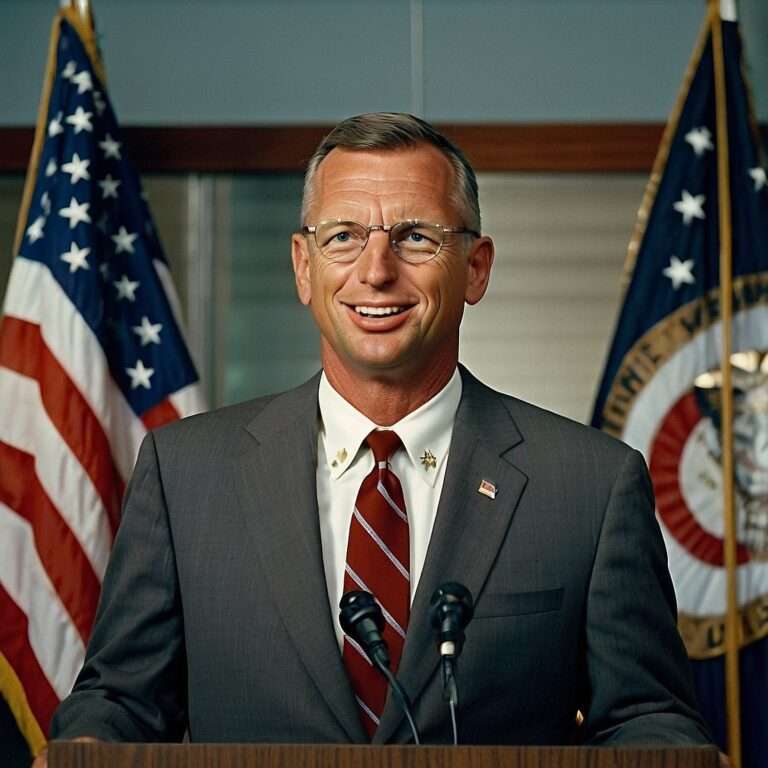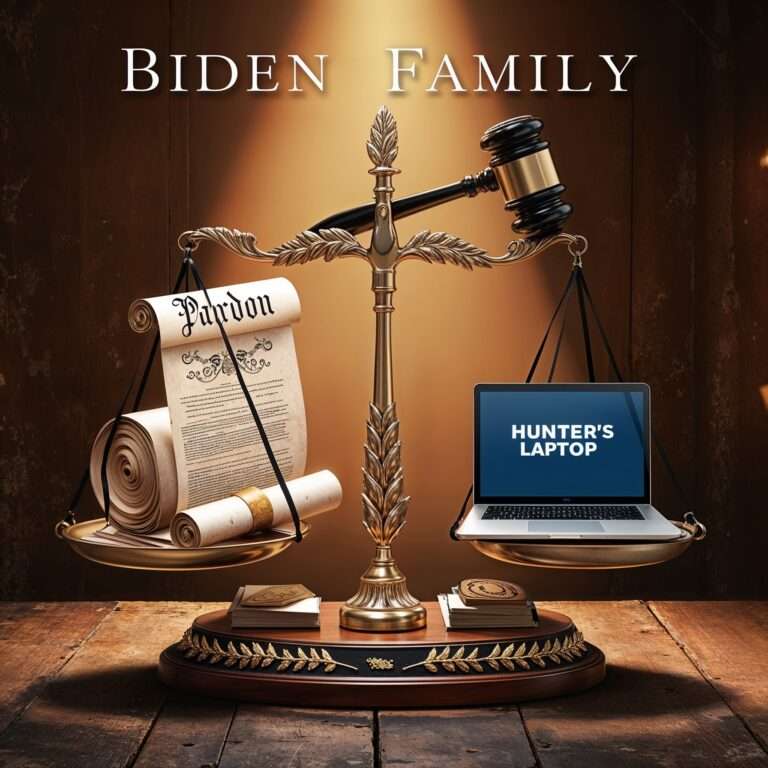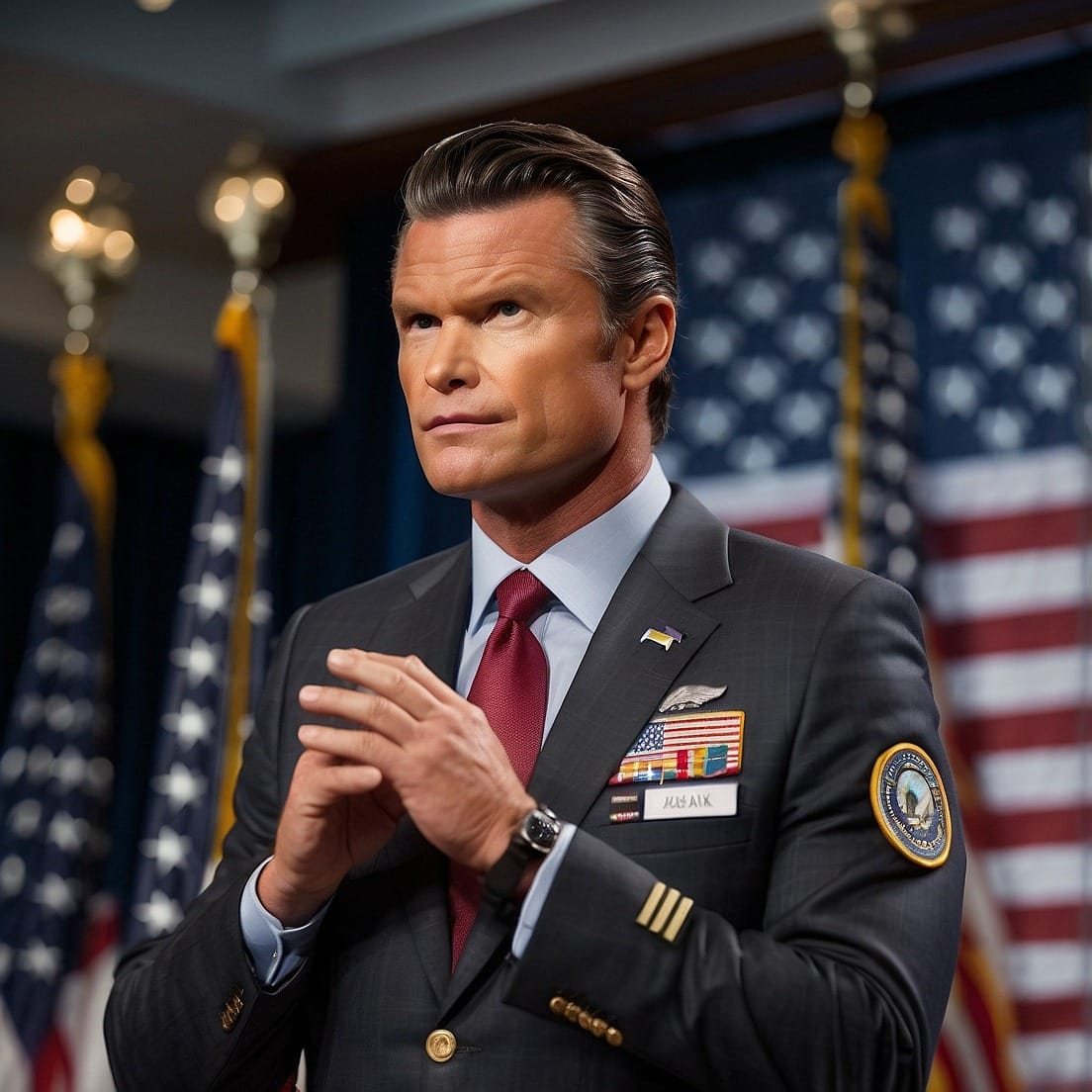
Pete Hegseth at the Pentagon podium, embodying the role of Secretary of Defense with a focus on strategic leadership and military readiness.
Pete Hegseth: A Polarizing Candidate for Secretary of Defense
Pete Hegseth, a decorated Army veteran and conservative media personality, has gained attention as a potential candidate for Secretary of Defense in a future Trump administration. Known for his alignment with Trump’s “America First” agenda, Hegseth brings a blend of military service, media savvy, and strong advocacy for veterans. However, his candidacy raises questions about his preparedness to manage the sprawling Department of Defense (DoD) and whether his partisan image could complicate efforts in an already polarized political environment.
This article explores Hegseth’s qualifications, potential opportunities his leadership might bring, and the challenges he could face as Secretary of Defense.
The Responsibilities of the Secretary of Defense (SecDef)
The Secretary of Defense holds one of the most critical roles in the federal government, responsible for safeguarding national security and maintaining the United States’ status as a global defense leader. Below is a detailed look at the SecDef’s key responsibilities, expanded for SEO and readability.
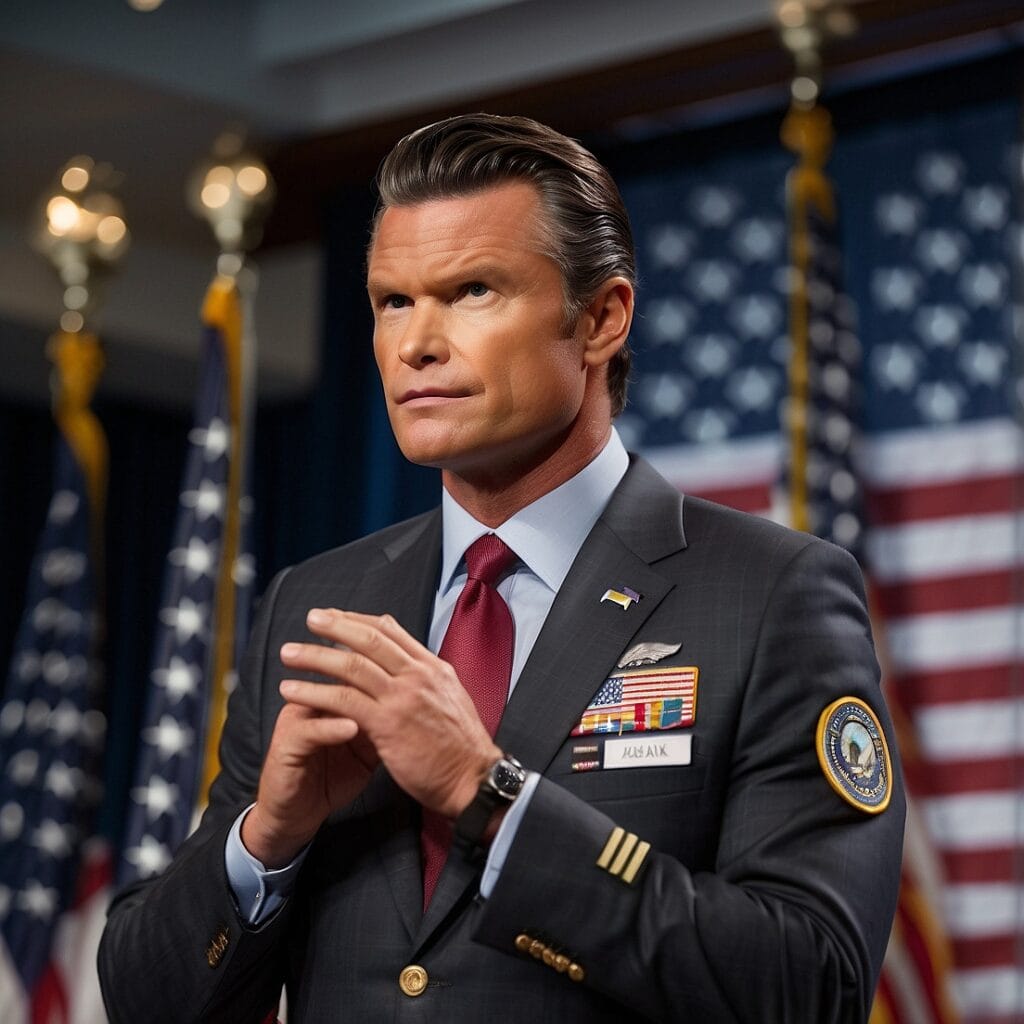
1. Advising the President on Defense and Military Policy
As the principal advisor to the President on defense matters, the SecDef provides expert guidance on:
- Strategic Threat Assessments: Evaluating immediate and long-term dangers from adversaries like China, Russia, and non-state actors such as terrorist organizations.
- Military Engagement Decisions: Offering counsel on the deployment of U.S. forces, whether for counter-terrorism operations, peacekeeping missions, or large-scale conflicts.
- Shaping Defense Doctrine: Crafting the strategies that define America’s military priorities, including nuclear deterrence and cyber defense measures.
The SecDef’s input directly shapes decisions that impact the nation’s security and military readiness.
2. Overseeing the Department of Defense
The Secretary of Defense manages the DoD, one of the largest bureaucracies in the world, comprising:
- Military Branches: Army, Navy, Air Force, Marine Corps, and Space Force.
- Personnel: Nearly 3 million active-duty service members, reservists, and civilian employees.
- Global Operations: Overseeing military bases, recruitment, troop morale, and veteran transitions.
Effective leadership in this role requires streamlining operations while ensuring that directives from the White House are implemented efficiently across all branches.
3. Developing the National Defense Strategy (NDS)
The SecDef plays a critical role in crafting the National Defense Strategy, a blueprint for addressing current and future threats. This includes:
- Prioritizing Threats: Identifying the most pressing dangers, such as cyberattacks, terrorism, and geopolitical conflicts.
- Enhancing Capabilities: Directing resources toward cutting-edge technologies like AI, hypersonic weapons, and space-based defense systems.
- Interagency Collaboration: Working closely with intelligence agencies, the Department of State, and the Department of Homeland Security to align defense objectives with broader national security goals.
The NDS ensures the U.S. military remains prepared to face evolving threats while maintaining a competitive advantage.
4. Managing Defense Budgets and Resources
The DoD budget exceeds $700 billion annually, making the SecDef’s role in resource management vital. Key responsibilities include:
- Allocating Resources: Distributing funds effectively across personnel, procurement, and research.
- Modernizing the Military: Investing in next-generation technologies to maintain an edge over adversaries.
- Ensuring Efficiency: Balancing fiscal responsibility with the need to sustain a capable and advanced military force.
The challenge lies in optimizing spending while avoiding waste and ensuring readiness for both conventional and emerging threats.
5. Strengthening International Partnerships
The SecDef serves as a key player in fostering global alliances and maintaining U.S. leadership on the world stage. This involves:
- Defense Alliances: Strengthening relationships with NATO and other allies to counter global threats.
- Regional Stability: Promoting peace and deterring aggression in critical regions like the Middle East and Indo-Pacific.
- Military Diplomacy: Collaborating with foreign defense leaders on joint exercises, intelligence sharing, and strategic initiatives.
International partnerships reinforce U.S. security and uphold its global influence.
Why Pete Hegseth Could Excel as Secretary of Defense
Pete Hegseth’s potential as Secretary of Defense stems from his alignment with Trump’s vision, his military service, and his ability to communicate effectively with both the public and policymakers. Below, we examine these strengths in detail and their implications for leading the Department of Defense.
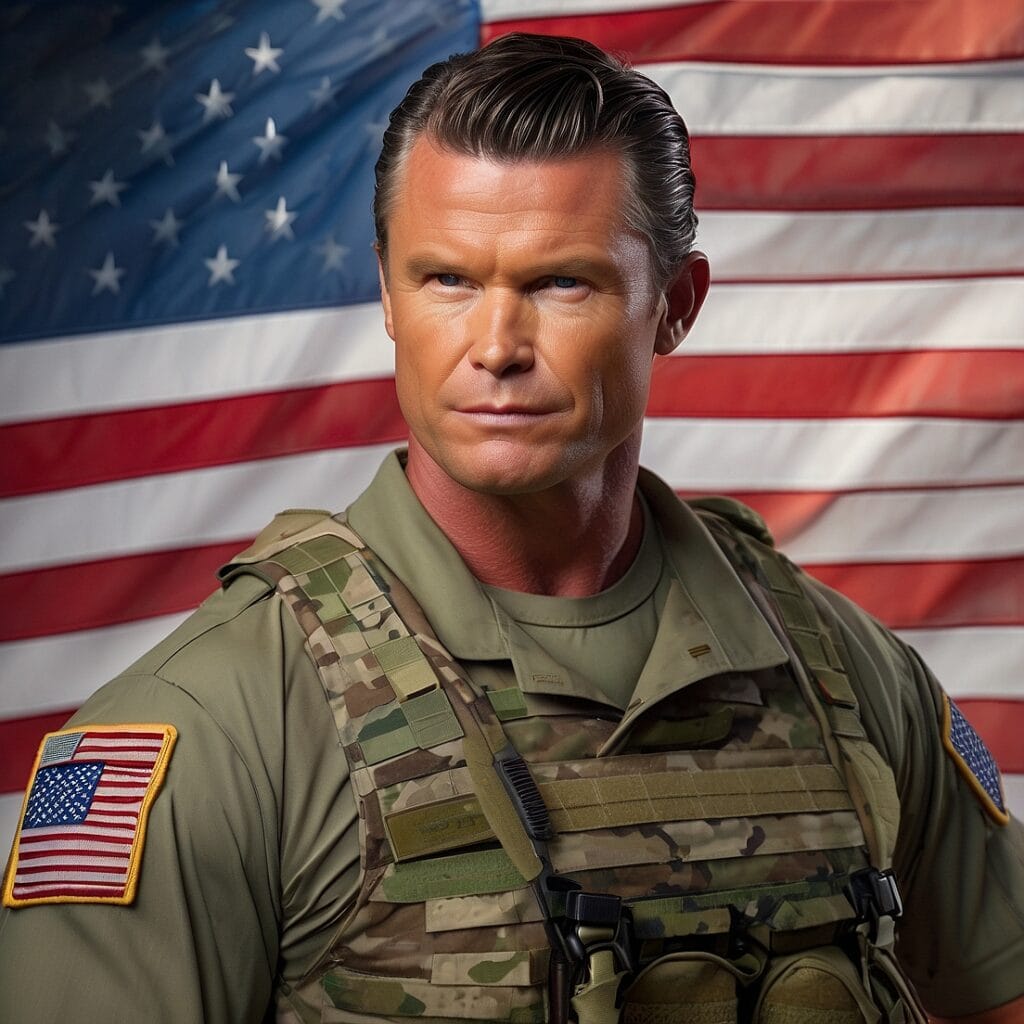
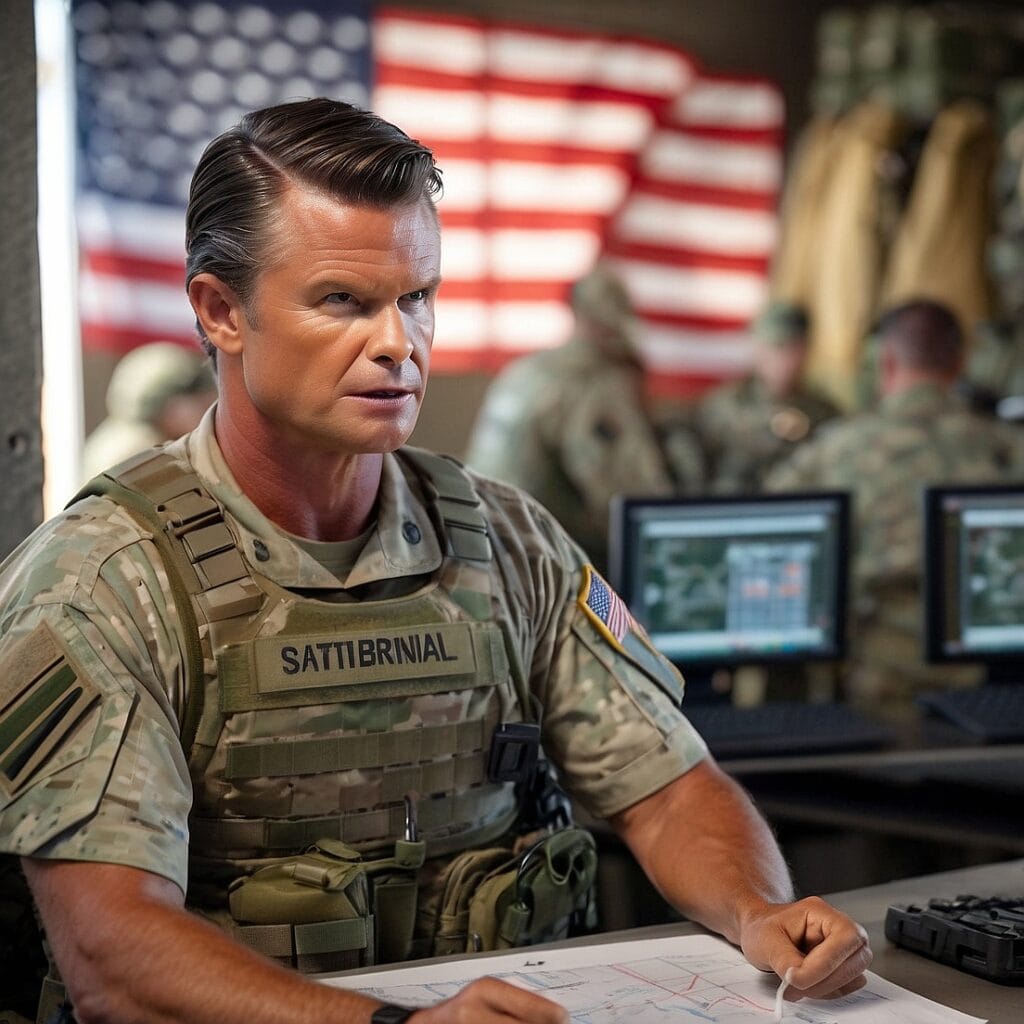
1. Alignment with Trump’s “America First” Vision
Hegseth has consistently championed the “America First” defense policies emphasized during Trump’s presidency. These priorities include fortifying the military, minimizing involvement in prolonged foreign conflicts, and focusing on homeland security.
- Focus on Homeland Defense: Hegseth argues that the military’s primary mission should center on protecting U.S. interests at home rather than engaging in nation-building efforts abroad. This resonates with Trump’s goal of reducing America’s footprint in global conflicts.
- Reducing “Endless Wars”: Hegseth aligns with Trump’s push to withdraw from prolonged engagements, such as Afghanistan, advocating for a defense posture that minimizes foreign intervention while maintaining readiness to address direct threats.
“The mission of the U.S. military is to defend our homeland—not rebuild other nations.” – Pete Hegseth
By mirroring Trump’s defense priorities, Hegseth could facilitate a cohesive and unified approach between the Pentagon and the White House. This synergy may streamline decision-making, resulting in more focused and efficient defense strategies.
2. Military Service and Advocacy for Veterans
Hegseth’s extensive military experience, including combat tours in Iraq and Afghanistan, brings a perspective rooted in frontline realities. His firsthand understanding of military operations and veteran issues is a unique asset for a Secretary of Defense.
- Credibility Among Troops: Having served in leadership positions during active combat and overseeing operations at Guantanamo Bay, Hegseth commands respect among military personnel. His service lends credibility to his policy recommendations.
- Advocacy for Veterans: As a former director of Concerned Veterans for America, Hegseth demonstrated a commitment to reforming the Department of Veterans Affairs (VA) and addressing systemic issues like healthcare access and bureaucratic inefficiencies. His work suggests he could extend this advocacy to address challenges faced by active-duty personnel.
Hegseth’s military background ensures a practical, troop-focused approach to defense policies. He understands the need for better equipment, mental health support, and family services, which are crucial for maintaining morale and effectiveness within the ranks.
3. Communication Skills and Media Savvy
In an age where public opinion plays a critical role in shaping defense policies, Hegseth’s media experience offers a distinct advantage. As a prominent conservative commentator on Fox News, he has honed his ability to articulate defense issues in a way that resonates with diverse audiences.
- Public Engagement: Hegseth’s ability to break down complex defense strategies into relatable terms can help demystify the DoD’s work, fostering public understanding and support.
- Building Trust: His approachable style and transparency make him a relatable figure, capable of bridging the gap between military leadership and civilians.
Example: By leveraging his media platform, Hegseth could effectively communicate the DoD’s goals, explaining key initiatives to secure bipartisan backing and public trust.
His strong public presence not only helps in shaping perceptions but also ensures that defense policies are conveyed with clarity and purpose, strengthening confidence in the military’s leadership.
Summary: The Case for Pete Hegseth
Pete Hegseth’s alignment with Trump’s “America First” vision, credibility among troops, and media skills position him as a candidate with unique strengths. While his approach may appeal to those favoring a streamlined and domestically focused defense strategy, his ability to navigate the complexities of the Department of Defense remains a critical factor. Hegseth’s leadership could redefine the DoD’s priorities, focusing on homeland security and the well-being of America’s military personnel.
Potential Challenges for Pete Hegseth as Secretary of Defense
While Pete Hegseth’s candidacy for Secretary of Defense highlights his strengths, several challenges raise questions about his readiness to lead one of the most critical departments in the U.S. government. These challenges could affect his ability to manage the Department of Defense effectively and uphold its mission.
1. Limited Experience in Defense Bureaucracy
Hegseth’s military service lends him credibility among troops, but leading the Department of Defense (DoD) requires navigating a complex bureaucracy that includes nearly 3 million personnel and a $700 billion annual budget.
- Strategic Oversight: The role demands crafting large-scale defense strategies, balancing resource allocation, and anticipating future security threats—areas where Hegseth lacks extensive experience.
- Navigating Politics: Effective leadership involves working with Congress, fostering interagency collaboration, and balancing competing interests within the military hierarchy. These tasks require a nuanced understanding of Washington politics and bureaucratic processes, which Hegseth has yet to demonstrate.
Key Concern: His limited experience managing a department of this scale raises doubts about whether he can oversee operations efficiently while adapting to the demands of modern warfare.
2. Concerns Over Politicization
Hegseth’s close ties to Trump and his prominence as a conservative media figure have fueled fears that his appointment could politicize the Department of Defense, an institution historically seen as nonpartisan.
- Partisan Perception: Critics worry that Hegseth’s outspoken political alignment may alienate defense leaders and create the perception of favoritism or bias within the military.
- Impact on Morale: A politicized defense leadership could undermine morale among service members, complicate cooperation with allied nations, and erode public trust in the Pentagon’s impartiality.
Balancing Act: To succeed, Hegseth would need to rise above partisan divisions and focus on advancing the DoD’s mission of protecting national security.
3. Contentious Senate Confirmation Process
Given Hegseth’s controversial views and limited policy experience, his nomination would likely face strong opposition during Senate confirmation hearings.
- Democratic Resistance: Lawmakers may question whether Hegseth’s alignment with Trump’s agenda compromises his ability to act independently and impartially.
- Polarizing Opinions: Hegseth’s critiques of military reforms, such as the inclusion of women in combat roles, could alienate moderate Republicans and Democrats, complicating his confirmation process.
Senate Dynamics: Without demonstrating bipartisan appeal and clear qualifications, Hegseth could struggle to secure the Senate’s approval, delaying his appointment and undermining confidence in his leadership.
Balancing Strengths and Weaknesses
Pete Hegseth’s candidacy represents a unique combination of opportunities and challenges. His alignment with Trump’s America First vision, military service, and advocacy for veterans provide a strong foundation for bold, troop-focused reforms. However, his limited experience in defense administration and the risks of politicization raise legitimate concerns about his ability to lead effectively.
The Core Question: Can Hegseth leverage his combat experience and media savvy to bridge his administrative gaps, or will these challenges overshadow his potential contributions?
DARWIN’s Take: Pete Hegseth Secretary of Defense – A High-Risk, High-Reward Nomination
Pete Hegseth’s potential appointment underscores the tension between traditional military values and the modern complexities of defense leadership. His advocacy for a military-first, America-focused defense strategy appeals to those seeking a return to foundational principles. Yet, his lack of bureaucratic expertise and polarizing public image highlight the risks of his candidacy.
“Hegseth represents both promise and peril for the Pentagon. His leadership could reinvigorate the military’s focus, or exacerbate divisions within an already strained institution.”
The Department of Defense faces a rapidly evolving landscape of global threats, from cyber warfare to rising tensions with adversaries like China and Russia. Whether Hegseth can adapt to these challenges while managing the intricacies of defense policy remains to be seen.
His nomination raises a broader debate: Should the Pentagon prioritize combat experience and ideological alignment, or does the role demand the administrative acumen of seasoned policymakers? Hegseth’s tenure, if realized, could redefine the role of Secretary of Defense, offering either a bold new direction or a cautionary tale of the risks inherent in politicized appointments.
Sources
Further Related Reading on Paranoid Prophet
- Pete Hegseth as Secretary of Defense: How His Leadership Could Reshape the Pentagon
This article delves into Pete Hegseth’s potential appointment as Secretary of Defense, examining his military background and the possible implications for U.S. defense policies. - Hegseth VA Reform: Privatization and Innovation for Veterans’ Care
An analysis of Pete Hegseth’s proposals to overhaul veterans’ healthcare, focusing on privatization and modernization efforts. - Trump’s Second Term Cabinet Picks: A Look at Potential Appointments
A speculative piece exploring potential cabinet appointments in a hypothetical second term for Donald Trump, including discussions on defense leadership.
Related Resources
For a comprehensive understanding of Pete Hegseth’s potential nomination as Secretary of Defense, consider the following articles:
- “How Hegseth Cultivated an Image That Caught Trump’s Eye”
This article explores Pete Hegseth’s rise as a Fox News host and Army veteran, highlighting his alignment with President-elect Donald Trump’s perspectives and the controversies surrounding his nomination. The Wall Street Journal - “Duckworth Rips into Hegseth: ‘He is Unqualified for the Position'”
Senator Tammy Duckworth criticizes Pete Hegseth’s nomination, questioning his qualifications and views on women in combat roles, and expressing concerns about his suitability to manage the Pentagon’s extensive operations. Politico - “Pete Hegseth’s Nomination at Risk As Police Report Emerges”
This piece discusses the resurfacing of a past sexual assault allegation against Pete Hegseth, detailing the incident and its potential impact on his nomination for Secretary of Defense. New York Magazine - “Pete Hegseth Will De-Woke the Pentagon and Restore the Military’s Mission”
An opinion article advocating for Pete Hegseth’s approach to reforming the Pentagon by eliminating identity politics and refocusing on combat preparedness, while addressing criticisms of his views on military policies. New York Post - “How Trump’s Army Veteran Pick for Pentagon Chief, Fox & Friends’ Pete Hegseth, Sees the World”
An analysis of Pete Hegseth’s conservative views on military and defense topics, including his skepticism towards NATO, support for Israel, and opposition to diversity policies within the military. Business Insider
FAQ: Pete Hegseth Secretary of Defense
Pete Hegseth’s Background and Qualifications
Q: Who is Pete Hegseth, and why is he being considered for Secretary of Defense?
A: Pete Hegseth is a decorated Army veteran and former executive director of Concerned Veterans for America. Known for his strong alignment with Donald Trump’s “America First” policies, he has been floated as a potential Secretary of Defense due to his military service and conservative leadership.
Q: What military experience does Pete Hegseth bring to the Secretary of Defense role?
A: Hegseth served in the Army National Guard, completing tours in Iraq, Afghanistan, and Guantanamo Bay. He received the Bronze Star Medal and other accolades, showcasing his leadership in combat situations.
Q: What are Pete Hegseth’s views on military and defense policy?
A: Hegseth advocates for a strong national defense, reduced foreign entanglements, and a focus on domestic military priorities. He supports Trump’s “America First” strategy and has voiced opposition to prolonged overseas conflicts.
Key Challenges and Opportunities
Q: How does Pete Hegseth plan to address bureaucratic inefficiencies within the Department of Defense?
A: Hegseth has criticized bureaucratic inefficiencies and advocated for streamlined processes. While specific plans remain unannounced, his leadership style suggests a focus on cutting red tape and empowering front-line leaders.
Q: What criticisms surround Pete Hegseth’s potential appointment as Secretary of Defense?
A: Critics point to Hegseth’s lack of experience managing large bureaucracies like the Department of Defense. Others express concerns about his close alignment with Trump and the risk of politicizing the Pentagon.
Q: How would Pete Hegseth approach defense spending and budget management?
A: Hegseth has emphasized the importance of prioritizing spending on military readiness, troop welfare, and modernizing technology. However, some question his ability to manage the DoD’s complex $700 billion budget effectively.
Impact and Implications
Q: What changes might Pete Hegseth bring to U.S. military strategy?
A: If appointed, Hegseth is likely to prioritize reducing U.S. involvement in “endless wars” while strengthening domestic security and border protection. He may also focus on modernizing the military to counter global threats.
Q: How does Pete Hegseth’s media presence influence his potential role as Secretary of Defense?
A: Hegseth’s strong media presence could help bridge the gap between the Pentagon and the public, effectively communicating defense strategies. However, critics argue this visibility could politicize defense policy.
Q: What are Pete Hegseth’s views on military diversity and inclusion?
A: Hegseth has expressed skepticism about diversity initiatives within the military, arguing for a return to a focus on combat readiness and traditional values. This perspective has drawn both support and criticism.
Long-Term Vision
Q: How would Pete Hegseth balance modernization and tradition in the U.S. military?
A: Hegseth is expected to advocate for maintaining traditional military values while integrating cutting-edge technology to address modern threats. Balancing these priorities will be central to his leadership approach.
Q: What legacy could Pete Hegseth leave as Secretary of Defense?
A: Hegseth’s legacy would likely be defined by his alignment with Trump’s defense policies, his efforts to streamline the DoD, and his focus on strengthening the military’s core mission. Whether he can overcome challenges of experience and politicization will shape his impact.
